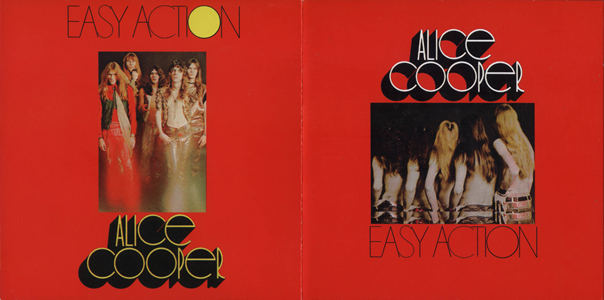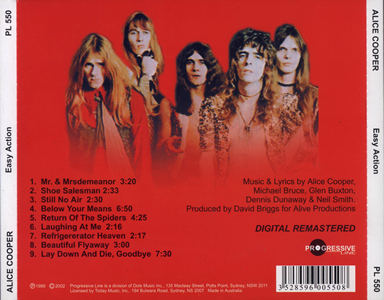FZ & Alice Cooper
I used to have a record company and they came over to my house to audition for a contract. They had been working in Arizona and I woke up— Some friends told me they were coming over to audition and I was upstairs sleeping and I had this basement, it's a log cabin in Laurel Canyon, that was real big, we used to practise in there. So they'd come in and set up their equipment while I was still asleep and I woke up to it one day. Went down, there they were, playing their little hearts up.
[...] I waited until I saw 'em play in concert a few times and they were the opening act for us several times and invariably when they would play, thousands of people would leave the room and I knew they had something. [...] Well, people had a very violent response to it, and if you look at the people who's responding that way and then you look at the response and you listen to what's going on then you can make an assumption that something is going on, you know? And the record company that I had was called Bizarre, and I was putting out albums by people like Wild Man Fischer and stuff like that, so I figured, well, here we go.
Frank Zappa liked us because he would say, "You've got five songs here that are two minutes long, and there's 38 changes in each one of them!" The great compliment was, he would go, "I don't get it—that's great, that's why I'm signing you."
We were playing a big party in LA, with the Doors, Buffalo Springfield, Love—all those great bands—and we came on next to last because we were the house band. Everybody in the audience was on acid, of course, grooving on peace and love, and then all of a sudden you hear this DA-NA-NAA-NAAA and there's these insanity-looking clowns onstage. We scared the hell out of these people. They were all on acid, we looked like we'd just come up out of the ground, and we didn't mind a little violence onstage. That audience couldn't get out of the room fast enough. It was like somebody yelled "FIRE!" There were three people left standing: Frank Zappa, my manager Shep Gordon and one of the GTO's. Frank said, "Anybody that can clear a room that quick, I've got to sign."
Martin Aston, "Alice Cooper: The Mojo Interview," Mojo #205, December, 2010
How did you end up on Frank Zappa's Straight label?
No other record company would touch us. After we move to LA, we were living at The Landmark Hotel where Miss Christine and the other GTO's lived. Se was Dweezil's babysitter! Christine told Frank, "Why don't you take a look at Alice Cooper, they're this band of guys from Phoenix, and they're a lot like us," which intrigued Frank. He came to see us at The Cheetah Club, at Lenny Bruce's birthday party [October 13, 1968? FZ was in Europe by then], and The Doors, Jefferson Airplane, Paul Butterfield, every great band you can imagine, was playing, and then we came on! We started out with Out In The Streets by The Who and literally emptied that room by the second song. The other bands were groovey, LA-mellow, everyone in the audience was on a nice acid trip, and here comes this horror cartoon, blood everywhere, looking like insane clowns, and so much bad attitude. We didn't mind a little violence; we'd do a part based on West Side Story, with the knife fight. Oh man, it was so against the rules in LA. There were literally five people left standing. One was Frank, another was Shep [Gordon], who became our manager. Frank said, "Anyone who can clear a house that quick, I gotta have, come over and play me your songs."
He told you to turn up at seven, which you took to mean 7am...
Frank very rarely went to bed, he lived in the studio on coffee and cigarettes, so 7am didn't sound unreasonable. And anyway, we were so over-anxious! We turned up as Alice Cooper, all chrome pants and stuff, and started playing in the basement, and Frank came down with his coffee, like, "What are you doing?" But we kept playing. Maybe the best compliment I've ever got was Frank saying, "I don't get it." Musically, he said, we had six songs that were all two minutes long, but all have 35 changes in them an no returning theme. I said, "Is that a bad thing?" "Oh no," he replied, "that's great, I love the fact that I don't get it." He wanted to record us live because he thought nobody would believe we could play this stuff live, so Pretties For You was recorded in three days. Frank dis some engineering but production-wise, he said he didn't wan his signature on it.
A couple of times [the Cheetah club] had a free concert, usually with the house band Nazz that later became Alice Cooper. [...]
The Cheetah Club only stayed open for a year and a half, but during that time they had the biggest bands of the time. After it closed there were a few free concerts and benefits held there. The house band Nazz that became Alice Cooper seemed to be there much of the time. One unsuccessful night Nazz emptied the ballroom only after ten minutes of loud playing! However, Frank Zappa thought Nazz were different and promoted them. It is said that The Grateful Dead guitarist Jerry Garcia had a prized guitar stolen there one night.
[...] In 1968 there was a huge outdoor free rock concert on the south side of the pier next to the Cheetah. It was called "Brucemas" celebrating the deceased comedian Lenny Bruce's birthday. The bands used the Cheetah Club for setting up and played music on the side of the pier overlooking the beach below. There were over 30,000 hippies and bikini girls wildly dancing and smoking pot on the sand from Navy Street to Rose Ave.! It was one of the biggest and best happenings ever in Venice!
They were skinny guys who drank a lot of beer and wore skinny jeans and t-shirts. And then Vincent met FZ and he introduced him to Miss Christine—and shortly thereafter, got management.
Patrick Neve
I'm sure you're aware Zappa discovered Vincent Furnier and gave the band their first couple of record deals. Frank's band of groupies, the GTO's, gave the band the makeover that you see today. FZ: "When I first saw them, they looked pretty much like a bunch of guys from Arizona". Later, in his "Behind the Music" biopic, Vince said that Frank had tried to get them to change their name to "Alice Cookies", but he could never figure out why.
Alice looks back at "Pretties" now and sees the absurdity of it but back then they were very serious and kind of disappointed with Zappa who wanted to turn them into a comedy act and rename them "Alice Cookies" (Renfield, June 1995)
Ben Watson, The Negative Dialectics Of Poodle Play, p. 157
According to Zappa, Cooper's relationship with Christine Frka furnished him with most of his ideas.
Andrew Proue, March 29, 2002
In this month's MOJO, they asked 100 people who their heroes were. Alice Cooper picked Frank:
Frank was the only one who stuck out his neck for us, for me. He was the one who said, "Here's a band that everybody in the business is laughing at—I like 'em." He was the perfect voice of cynicism, making fun of his audience, the establishment, the guys with the grey suits, the hippies, everyone. He was the outcast in LA, and so were we. We were the band everybody loved to hate. We stood for everything the hippies hated. We did not want peace, love and wonderfulness—we wanted Ferraris, money, girls, switchblades. Frank loved it. He said, "I'm starting a record company [and] I want you guys to be on it because it's for all the misfits out there." I'd watch him work in the studio and he was so far beyond anything I could imagine. All the stuff you hear on the Zappa albums that sound like little improvisations and mistakes, they're all written—every little squeak, bump and fart.
I was in a place called The Experience one night in '68 or '69. Mike Bloomfield was in there, Jimi Hendrix was in there, Elvin Bishop. The premier guitar players all playing, all taking a solo . . . then Frank gets up and does an imitation of everyone there—Mike, Jimi, the whole—and then plays his own stuff. You should've seen the look on Hendrix's face! He blew everybody away. People were just atounded by the guy's virtuosity.
We got to be very good friends. If you could make him laugh, you felt like you scored big. I'd sit there pretty quietly like a little mouse watching him work. He was truly one of a kind. There's nobody else out there trying to even be Frank because he's too hard to imitate. We could use a Frank right now.
"I'd seen Zappa play at Thee Experience club in LA," Alice recalls now. "One night it was Eric Clapton, Mike Bloomfield, Jimi Hendrix, all jamming. Then Frank gets up and does an imitation of each one of them! Then he takes off and starts playing his own riffs, and those other guys just stood there, like, 'What?!' Cos this guy was doing stuff that they had never seen before. Even Jimi Hendrix. Frank gave Hendrix his first wah-wah pedal and showed him what it was."
When one of the Log Cabin regulars told Frank of this band that every record label in LA had turned down, he asked to see them. The following morning, at seven o'clock, they were on his front lawn, bashing out their strangely unlovely set.
"We got our times wrong. We'd heard he wanted us there at seven, we figured he meant seven in the morning," says Alice. "But we played five songs that were two minutes long and had, like, 25 changes in them, and he sat there and he listened. Then he looked at me and said: 'I don't get it. I don't get what you just did.' And then we played another one for him that did the same thing. And then another, and another. They were like if you took an ELP prog piece and condensed it to two minutes. And he just kept going: 'I . . . don't . . . get . . . this!' I said: 'Is that bad?' He said: 'No. The fact I don't get it is why I'm signing you.'"
(LP, Straight STS-1051, 1969)
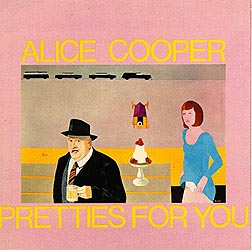
69 LP Pretties For You (Straight STS-1051)
8T Pretties For You (Warner/Reprise)
05/19/69 7" Reflected/Living (Straight ST 101)
02/09/70 LP Pretties For You (reissue, Straight/W.B. WS 1840)
89 CD Pretties For You (Bizarre R2-70351)
89 CS Pretties For You (Bizarre R4-70351)
CD Pretties For You (Rhino 70351)
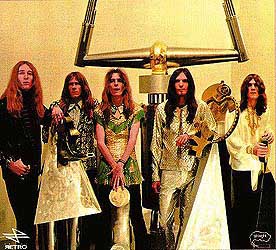
Album Credits
Alice Cooper (Vincent Furnier) Vocals
Michael Bruce Guitar, Keyboards
Glen Buxton Guitar
Dennis Dunaway Bass
Neal Smith Drums
Music, Lyrics and Arangements by Alice Cooper [group]
Produced By Alice Cooper [Group]
Cover Painting By Ed Beardsley
Photography by Ed Caraeff
Design by John Williams
1. Titanic Overture 1:09
2. 10 Minutes Before the Worm 1:27
3. Sing Low, Sweet Cheerio 5:33
4. Today Mueller 1:38
5. Living 3:02
6. Fields Of Regret 5:36
7. No Longer Umpire 1:54
8. Levity Ball (Live At the Cheetah) 4:23
9. B. B. On Mars 1:08
10. Reflected 3:10
11. Apple Bush 2:57
12. Earwigs to Eternity 1:14
13. Changing, Arranging 2:58
total time—> 36:10
Rick Jones, December 31, 2002
Vince also played harmonica. Michael sang the first two verses of "Sing Low." There are orchestral strings on a portion of "Levity Ball" that was due to the fact that it was a used tape and erased poorly before being utilized to record the band live at the Cheetah.
Recording Sessions
Alice Cooper (unidentified source)
"In November of 1971 [1968 I guess it's meant to be] we recorded our first album, Pretties For You. For a week straight we arrived at the studio and played through every song five or six times with Herbie Cohen and Zappa working over the levels in the control room. We thought we were just getting down to business, ready to lay the bed tracks and experiment, when Zappa walked out of the glass-enclosed booth and said, "Okay. Your album will be ready next Thursday." I said, "There are a few mistakes in that stuff. We weren't even ready to record," but he just patted me on the shoulder and said, "Not to worry. Not to worry. We'll work everything out in the mix." We didn't see or hear the album until five months later."
In a recent interview with Russell Hall of Goldmine magazine (May 19, 2000 issue), Alice Cooper Group drummer Neal Smith reminisces about the Pretties For You album. "I like Pretties For You for its originality. When you create music that sounds like other music that's going on at the time, it becomes dated. On the other hand, when you do something that's different, it has a better chance of holding up over time. Unfortunately, when we went into the studio, we were very green, and we didn't know anything about the recording process. Frank Zappa said he wanted the album to sound like a car driving past a garage while a band was playing. That was his goal, and I think he more or less achieved it. He had us set up our amps around the drum set, so there was total leakage. We would run down the song—setting the dials on our amps and stuff, just trying to get a proper sound going so that we could record—and Zappa would say,"We got a take." We would be like, "What? We didn't even play the song yet."
The Cover Art
Patrick Neve, alt.fan.frank-zappa, January 16, 2003
Oh yeah, I forgot to mention that the cover art to Pretties For You, a painting by Ed Beardsley, can be seen on the wall of FZ's place in this picture of him with his parents:

Frank, a friend of mine, was visiting my studio one day, bought two paintings he wanted to used for album covers, one for Alice Cooper, another for the Mothers of Invention. The two paintings purchased: 'Pretties for You' and 'The Four Apostles'. Both ended up in Frank's home, 'Pretties for you' in the main living room, and 'Apostles' in the downstairs music studio. Who knows what happened to them after Frank's death. I'm still in touch with his brother, Bobby, but not his wife or kids.
In one of the photographs used for Frank's story [in Life magazine] you can see an oil painting on the wall that hung in Frank's house. Edward Beardsley, a professor at the University of California at Riverside and one of Frank's and my close friends from our days in Claremont, had painted it.
Professor Beardsley painted two pictures with the same character, a heavyset man with a mustache holding a cup of coffee. Frank had one and I have the other [...], called "Suburban Sunrise."
Q: Does the ZFT still own the Master Tapes of Alice Cooper's first albums ? (I believe Frank used to own them). [...]
A: Nope. Never did. Just the painting on the cover of Pretties For You—but that was stolen.
(LP, Straight/WB WS 1845, 1970)
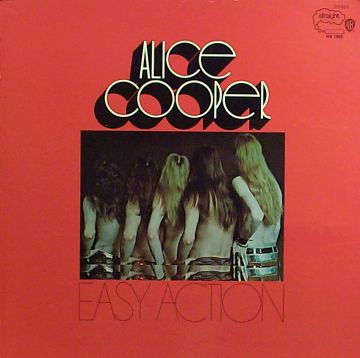
03/27/70 LP Straight/W.B. WS 1845)
90 CS Capitol 73391)
90 CD Capitol 73391)
91 CD Rhino 70350)
CD Bizarre R2-70350)
CS Bizarre R4-70350)
02 CD Progressive Line PL 550 ("DIGITAL REMASTERED")
(originally planned for 1969 release as Straight 1061 but was cancelled.)
Album Credits
1. Mr. & Misdemeanor 3:20
2. Shoe Salesman 2:33
3. Still No Air 2:30
4. Below Your Means 6:50
5. Return of the Spiders 4:25
6. Laughing at Me 2:16
7. Refrigerator Heaven 2:17
8. Beatiful Flyaway 3:00
9. Lay Down and Die, Goodbye 7:30
Alice Cooper—Vocals
David Briggs—Piano, Producer
Michael Bruce—Guitar, Keyboards
Glen Buxton—Guitar
Dennis Dunaway—Bass
Neal Smith—Drums
Barry Keane—Engineer
John Williams—Art Direction
Barry Keene—Engineer
Lorrie Sullivan—Photography
Herb Cohen—Executive Producer
Bill Inglot—Digital Remastering
Ken Perry—Digital Remastering
Music & Lyrics by Alice Cooper,
Michael Bruce, Glen Buxton,
Dennis Dunaway & Neil Smith.
Produced by David Briggs for Alive Productions.
Progressive Line CD cover art
Patrick Neve
